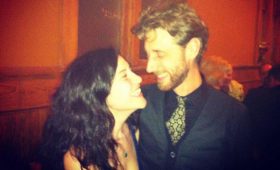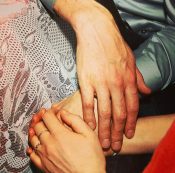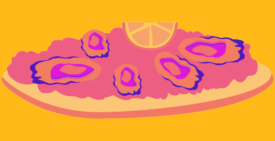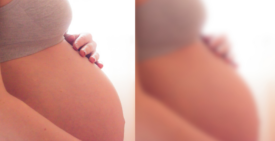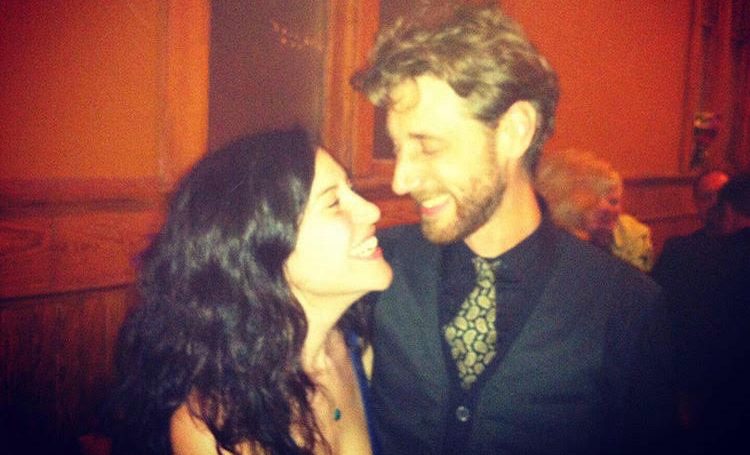
The author and her love, Brian (Courtesy of Mira Simone Etlin-Stein)
“Am I dying, Mir?” he asks me, as we lie together in the narrow hospital bed, holding hands in the darkness.
I sit up and turn to him. “Yes,” I say simply, “You are, Bri.”
He nods in acceptance. “So this is the end of my life.”
“Yes,” I say again, “This is the end of your life.”
His gaze never leaves my face, “Will you be here when I die?”
“Yes, I will be here when you die”.
A faint smile plays at the corners of his mouth. There’s a long pause, as we drink each other in, our eyes locked. And then he squeezes my hand, a look of urgency on his weary face.
“Mir, will you still be here after I die?”

Brian (Sandra Reds)
It has been almost seven weeks. Almost seven weeks since the day we found out that Brian has Stage Four Melanoma in multiple organs, his brain, and his bones. He is 41. I am 34. Our daughter, Davida, is about to turn 3.
Just over a month before we received the diagnosis, we had been snowshoeing through the forest together and I could barely keep up with him.
“Come on, Mir!” he called out as he raced ahead, his eyes shining brightly, “I have so much to show you.”
That night, when we returned home, he said, offhandedly, “I think I must have pulled my back out today.” And that was the first sign that something was “off.” It’s been less than three months since that day, I think, as I look around the hospital room. Music softly plays on the stereo, the birth playlist we made and used as I labored to bring Davida into this world. The room is dark and still.
We have missed the opportunity to bring Bri home to die. By the time the doctors have completed their necessary procedures so that he can be comfortable, they fear that Bri is too weak to make the journey. So I have transformed this nondescript hospital room into a sacred space, just as Brian transformed the basement of our apartment into a sacred space three years ago, for me to birth our daughter. Framed photographs, our dream catcher, sacred healing stones, and our salt crystal lamp cover the table in front of him.
READ: My Death Stories Are My Birth Stories’
These items rest on top of my favorite sarong, which we have brought with us on every vacation, cottage weekend, and camping trip together. It has served us well for picnics and stargazing, as a beach towel, shirt, changing table and, most importantly, as a “let’s make love under the full moon” blanket.
And now it will serve us again.
“I love your set up,” our sweet nurse Calvin tells us. “It’s so romantic.”
The quilt my grandmother made, which has followed us from apartment to apartment, always resting on the back of our living room couch to signal that this is our “home,” is draped over Bri’s legs and his cold, blue toes.
“I am writing this moment down in my mind’s eye,” he tells me. “Mir, this is a sacred time.”
He does not want to die. What he wants is to live vibrantly, openly, and fully, as he always has. What he wants is to raise our daughter, to grow old together, to enjoy our favorite foods, and to love each other in our silly little mortal bodies here on earth for as long as we possibly can. He loves life in all its complexity and all its simplicity.
Two days before taking his last breath, he says to me earnestly, “Mir, how can we make this fun?”
In one breath he tells me that this is fate, and then in another, he asks for the healthiest, most healing foods I can get my hands on, just in case it might “make a difference.” And this is the beautiful balance of Bri, these perfect contradictions; believing in healing, doing everything he can to thrive, and yet at the same time accepting that perhaps it isn’t meant to be.
Two days before taking his last breath, he says to me earnestly, “Mir, how can we make this fun?”
And so I try. We put his favorite album on the stereo and I dance around him, thinking of our epic dance parties together over the years. He drifts in and out of consciousness and every time he opens his eyes, he smiles and says, “Yeah! Yeah!”
Later that night, he reaches out to touch my hand. “Mir, you’re doing such a good job,” he says, always my biggest champion.

The author and her love, Brian. (Craig Makela)
The time ebbs and flows. Bri progresses on his journey and then stalls and comes back to me, just as my labor progressed and stalled when I gave birth to Davida.
Both experiences taught us to give up control and let nature take the lead. During Davida’s birth, when I felt like I couldn’t go on, Bri was my rock. And I try to be that rock for him now. We listen to our birth playlist and I dance, breathe, brush his suffering away, and ease him forward. From time to time he opens his eyes and says: “Hi Mir.”
He has one foot in another world and is so weak that he is barely able to acknowledge the friends and family who visit us. And still, somehow, one afternoon, he turns to me and says, “How is it possible that you look so good?” I laugh.
I know what he is saying, aside from being his typical sweet self. We are going through something so intense, so painful, so challenging. We are so connected. How is it that one of our bodies is wasting away into a thin, grey shadow of itself, while the other remains so solid?
We are in between worlds together.
I physically feel his pain. I throw up, as he lies dying beside me. I feel my soul stretching and moving outside myself, too, meeting his in another realm, even as his body slows, while mine stubbornly continues to function.
READ: Some Doulas Are Trained To Help the Dying
They say that over many years, couples begin to look alike. Their faces start to age together, taking on features that bear a striking resemblance to one another. We know that as human beings, our physical bodies are connected to our internal states: our feelings, thoughts, and souls. So, as two people connect internally, why wouldn’t their physical bodies sync up too? Their facial expressions, posture, bacteria, scent.
And so, as Bri’s body starts moving along a road that I cannot follow, a process of physical separation begins, slowly at first and then faster, rushed ahead by the ruthlessness of the disease that is consuming his physical body. I follow him to the brink, as far as I can manage. I peer over the edge, dip a toe into the infinite, and stop, letting him continue on his journey alone.
I find myself holding his beautiful body, feeling his soul filling the room with light, love, and magic. I’m laying my head on his chest, something I used to do every night until the cancer in his bones made it too painful, and took that act of intimacy away from us too. I have to remind myself as I lay my head, heavy with grief, that he can no longer feel pain.
All he can feel now is my love.
His words echo around me. “Mir, will you still be here after I die?”
So, this is after. I am still here.
I open my eyes, I kiss his face, I sit up, and I take a breath.
Mira Simone Etlin-Stein is a writer living in Toronto. Much of her writing on grief can be found on Instagram @newmoonmira.

